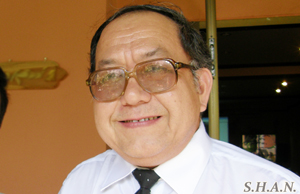Burma’s latest ethnic alliance formed in February has successfully established the long awaited Federal Union Army after 10 months, according to United Nationalities Federal Council (UNFC) Assistant Secretary General Hkun Okker.

The founding meeting, 16-17 December, was held at an undisclosed location along the Thai-Burmese border.
Maj Gen Bee Htoo of Karenni Army was appointed as its Commander-in-Chief, Brig Gen Gun Maw of Kachin Independence Army (KIA) as Deputy #1 and a yet-to-be-named Karen National Liberation Army (KNLA) commander as Deputy #2.
“The ball has begun rolling so things are getting better,” he said. “So we can’t really say we’re too late.”
This statement was in response to comments that it should have been formed when all eyes and ears were still focusing on the UNFC early in the year. Critics have pointed out that the alliance had done every little to either deter or stage a collective defensive against the Burma Army’s offensives against its members, the Shan State Army (SSA) ‘North’ (13 March) and the KIA (9 June).
According to its Circular #1 / 2011, the Federal Union Army’s aims and objectives are:
- To defend the Union
- To achieve peace
- To restore democratic rights and fundamental rights of the people
- To struggle for Equality and Right of self Determination
- To oppose human rights violations and war crimes committed by some elements of the Burma Army
- To serve as a rally point for Burma Army members who wish to stand by the people
- To become a part of the armed forces of the future federal union
The circular also designates the following armed groups as its allies: Arakan Liberation Army (ALA), All Burma Student Democratic Front (ABSDF), United Wa State Army (UWSA), National Democratic Alliance Army (NDAA) and the Shan State Army (SSA) ‘South’.
Apart from the first two, the rest are groups that have signed ceasefire agreements with Burma’s new government.
The UNFC has demanded that President Thein Sein, who had offered peace talks on 18 August, to deal with it directly instead of group by group. However Naypyitaw’s negotiators say it will hold direct talks only at the third stage of the peace process.
The three-stage peace process as outlined by U Aung Min, Naypyitaw’s chief negotiator at the 19 November talks, are: Ceasefire, Development and Conference to be held in the style of 1947 Panglong.


